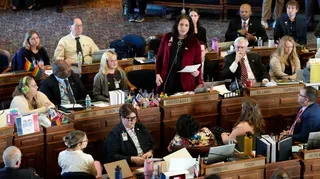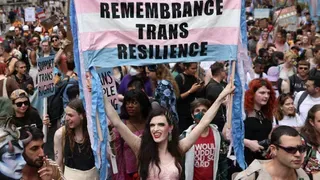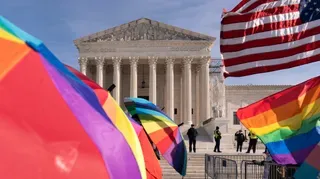October 8, 2007
ENDA vote postponed
Frances Betlyon READ TIME: 11 MIN.
After a public outcry from LGBT and civil rights organizations, leadership in the House of Representatives put on hold a plan to split the Employment Non-Discrimination Act (ENDA) into two separate bills, one banning discrimination based on sexual orientation and the other offering protections based on gender identity. In response to the decision to delay the vote on ENDA a coalition of more than 100 LGBT organizations launched a campaign, United ENDA, designed to shore up support in the House to pass a trans-inclusive version of the bill. Congressman Barney Frank (D-MA), working in concert with House Speaker Nancy Pelosi, introduced a plan to split ENDA last week after a preliminary vote count determined that there were not enough votes to pass the transgender-inclusive version of ENDA. Two coalitions of LGBT and civil rights organizations sent letters to House members demanding more time to lobby for support for the trans-inclusive ENDA, and by the afternoon of Oct. 1 Pelosi's office released a statement saying that mark-up of the sexual orientation version of ENDA, which had been slated for Oct. 2, will be delayed by two weeks to "allow proponents of the legislation to continue their discussions with Members in the interest of passing the broadest possible bill." The statement was co-signed by Frank and Congresswoman Tammy Baldwin, currently the only openly gay members of Congress, as well as Education and Labor Committee Chairman George Miller, whose committee was slated to mark up the bill.
Mara Keisling, executive director of the National Center for Transgender Equality (NCTE), the lead transgender organization lobbying in Congress for a trans-inclusive ENDA bill, said that with the postponement of mark-up she expects that the coalition of organizations working to pass ENDA will ratchet up their lobbying efforts to try to sway a majority of lawmakers to support the trans-inclusive bill. She said in addition to the handful of LGBT groups that already have lobbyists in , there are plans for both professional and citizen lobbyists from around the country to fly into D.C. to help bolster their efforts.
"We're being told we have a chance to pass an historic piece of legislation, and we need everybody to get involved, stay as focused as everybody's been for the past few days and get this work done," said Keisling. "And so we're just calling on people to stay totally focused, totally positive and we think we can get this done."
Dave Noble, director of public policy and government affairs for the National Gay and Lesbian Task Force, said that the United ENDA campaign, of which the Task Force is a member, would build on the activism of the past week by groups opposed to splitting ENDA and help them coordinate their lobbying efforts. He said the campaign is designed to help the organizations at the federal and state level coordinate their efforts and share information.
"It's just an opportunity for folks to come together regularly to get updates, and especially for folks doing the hard work at the state level, to have the lobbyists, the communications folks, the legal folks all in the same place at the same time so we can speed up the work to get done," said Noble.
In , Noble estimated there are at least 12 lobbyists working on behalf of a variety of LGBT organizations to try to build support for a trans-inclusive ENDA bill. Noble said the morning of Oct. 3 that he was scheduled to meet later that day with lobbyists and congressional staffers to identify lawmakers who might be willing to shift their support and to develop a strategy for reaching out to them.
Keisling credited the mobilization of LGBT organizations, following the announcement that ENDA would be split in two, with convincing House leadership to postpone mark-up of the bill. Two different coalitions sent letters Oct. 1 to lawmakers opposing the split bill strategy. One letter, sent by the Leadership Conference on Civil Rights and co-signed by Human Rights Campaign (HRC), NCTE, the National Gay and Lesbian Task Force, the American Civil Liberties Union, and other organizations, urged lawmakers to postpone the mark-up hearing and said the decision to split ENDA was "a mistake." That letter was sent to Pelosi, Frank, Baldwin and Miller. Another letter, drafted by the coalition that would eventually become United ENDA, was sent to every House member. The organizations signing that letter asked for more time to lobby for a trans-inclusive ENDA bill and pledged to actively oppose both split bills; nearly every major national LGBT group, including NCTE and the Task Force, signed the statement, with the notable exception of HRC.
Frank said he fears that even with two additional weeks to lobby, advocates will not be able to garner enough support from lawmakers to pass a trans-inclusive bill. He estimates that if the vote were taken today it would lose by at least 40 to 50 votes, possibly more if lawmakers sense the measure is likely to fail. He said many of the groups who pledged to oppose the split bill have been absent from Capitol Hill and have not been aggressively lobbying members to support the trans-inclusive bill.
"They have not been very helpful, and they look to the speaker and they think Nancy Pelosi is Glinda the Good Witch and can wave her magic wand and make that happen. ... It's the biggest weakness in our community, they don't do this grassroots lobbying," said Frank.
He said that if advocates fail to win enough support to pass the trans-inclusive ENDA they will once again have to decide whether to support split versions of the bill or forgo passing any form of ENDA this year.
"We'll wait two weeks and see what happens. I am afraid we'll be in that same position. I may be proven wrong," said Frank.
Pelosi's announcement last week that ENDA would be split into two bills generated a groundswell of activism from proponents of the trans-inclusive ENDA and exposed many longstanding tensions within the community over the issue of trans-inclusive legislation. HRC's absence from the statement pledging to oppose the split ENDA bills prompted activists to speculate what stance HRC would take on the split bill, given the organization's relatively recent decision to support a trans-inclusive ENDA bill. In 1999 the Task Force publicly announced it would withhold support from any ENDA bill without trans-inclusive language, but HRC supported ENDA bills that only offered sexual orientation protections until 2004; that year, after protests from transgender activists, HRC pledged to support only trans-inclusive versions of the bill.
On Oct. 2, after the announcement that the mark-up hearing had been canceled, HRC released a statement saying that HRC would neither support nor work to defeat a split version of ENDA.
"Since 2004 HRC has had in place a policy that supports only a fully inclusive version of ENDA and the board of directors voted [Oct. 1] to reaffirm that position," said HRC president Joe Solmonese, according to the statement. "Therefore, we are not able to support, nor will we encourage members of Congress to vote against, the newly introduced sexual orientation only bill."
The statement also hit back at critics who attacked the organization for not speaking out earlier against the split bill.
"Some may say we should have joined the growing chorus of public dissenters earlier. We believed, and still do, that the correct course of action was to continue dialogue with our allies on the Hill and work to the last minute to effect change," wrote Solmonese. He credited HRC's conversations with House leadership with their decision to give advocates two additional weeks to lobby for ENDA.
The decision to split the ENDA bills also met opposition from Baldwin, who declined to be listed as co-sponsor for either of the split bills. When asked about her decision not to co-sponsor the bills, 's spokesperson, Jerilyn Goodman, e-mailed Bay Windows a statement saying, "Congresswoman Baldwin is not a cosponsor of the two new bills, as an expression of her disappointment with a two bill strategy. She remains committed to getting ENDA to the floor in as strong a form as is politically feasible. While all of the Democrats involved in this discussion are committed to employment non-discrimination protections for transgender Americans, strong differences emerged over process, strategy and the acceptable level of risk taking, in bringing a bill to the floor. All of these discussions were centered around which course of action would allow us to ultimately pass protections for transgender people at the earliest possible opportunity."
Frank told Bay Windows that he believes the advocates who refuse to support any ENDA bill that is not trans-inclusive are pursuing a strategy doomed to failure. He said since ENDA was first introduced more than 30 years ago lawmakers and advocates have been working to educate House members about employment discrimination based on sexual orientation, and they have enough support to make an ENDA bill focusing on sexual orientation viable in the House. By contrast, he said it has been only within the last few years that lawmakers have been lobbied around adding gender identity to ENDA, and Frank said when House leadership did a whip count they found that some Democrats were willing to oppose ENDA if it included the gender identity language.
While opponents of splitting ENDA pointed to the successful passage of a trans-inclusive hate crimes bill in the House and Senate this year, Frank said ENDA is a harder sell than hate crimes. He said the goal of the split bill strategy is to pass an ENDA bill covering sexual orientation and put a second ENDA bill covering gender identity on a slower track, holding hearings and working to educate lawmakers about discrimination against transgender people to build support for the legislation.
Frank said that as a rule civil rights legislation is always incremental and that advocates should not deny employment protections to gay, lesbian and bisexual people across the country solely because there is not yet sufficient support for passing a trans-inclusive bill. He also said that if lawmakers take a vote on a trans-inclusive bill and vote it down, it will be harder to convince those lawmakers who went on record as voting against it to change their minds for a future vote.
"It's a problem in American politics where if you let the most militant group of people in your movement veto everything else, then what you wind up with is they feel pure and nothing gets better. If the gay community as a whole helps defeat a bill that covers sexual orientation, I don't know how we're going to get over that," said Frank.
Yet opponents of the split bill strategy say that passing an ENDA bill that only covers sexual orientation will make it more difficult to pass a later bill covering gender identity. Toni Broaddus, executive director of the Equality Federation, a network of LGBT rights organizations in 39 states and the District of Columbia and a member of United ENDA, said that an increasing number of states have passed non-discrimination laws covering sexual orientation and gender identity, but in states that only pass non-discrimination laws covering sexual orientation it can take years or decades to extend those protections to transgender people.
"When we have this two-bill strategy in the states we're looking at it's between five and 25 years before we ever get to adding protections for transgender people. So it's hard for us to even look at this strategy as something that serves our community well because we know it's been flawed in the states," said Broaddus. , which passed a sexual orientation non-discrimination law in 1989, has not passed a similar law covering gender identity or expression, although advocates are working to pass such a law in the current legislative session.
Keisling said if advocates are not successful at swaying enough lawmakers by the end of two weeks, NCTE will continue to oppose splitting ENDA, and she said she suspects most of the other members of United ENDA would agree. The members of United ENDA have pledged to oppose any non-inclusive version of ENDA.
"I think NCTE, like all these other organizations, will no doubt oppose that. But I don't even want to go there. It's too premature to talk about that," said Keisling. "I don't want to take away from the really big push we want to do here."
Rose resigns from HRC board over ENDA
Donna Rose, the only openly transgender member of the Human Rights Campaign (HRC) board of directors, announced Oct. 3 that HRC's decision not to oppose a split version of the Employment Non-Discrimination Act (ENDA) had prompted her to resign from the board. In a statement posted on her personal website, www.donnarose.com, Rose explained that HRC's decision not to align itself with the coalition of LGBT organizations who have pledged to oppose the split version of ENDA showed a failure of leadership on transgender issues.
"An impressive coalition of local and national organizations has lined up to actively oppose the divisive strategy that would leave some of our brothers and sisters without workplace protections. This effort has galvanized community spirit and commitment in ways few could have imagined, and it has demonstrated to those who would divide us that anything less than full inclusion is unacceptable," wrote Rose in her statement. "Organization after organization has seized the moral high ground knowing that this is a historic opportunity that cannot be squandered, and that it is our moral obligation to ourselves and to generations that will follow to make a loud, clear, unmistakable statement that we are a community and we will not be divided. There is a single significant organization glaringly missing from that list. The Human Rights Campaign has chosen not to be there."
Rose, who will remain on HRC's business council, did not respond to a request to comment for this story.
On Oct. 1 the HRC board voted to reaffirm its policy, adopted in 2004, of only supporting a trans-inclusive version of ENDA. But the board also voted not to encourage members of Congress to vote against the split version of ENDA. The HRC statement announcing the board vote did not say how many board members voted to in favor of those positions. HRC did not respond to requests to comment for this story.
By contrast, more than 100 other LGBT organizations, including the National Gay and Lesbian Task Force, the Equality Federation, Lambda Legal and the National Center for Transgender Equality (NCTE) have formed a coalition called United ENDA whose members have pledged to actively oppose any ENDA bill that does not include protections for the transgender community.
Rose wrote that she felt HRC's position on ENDA clashes with remarks Solmonese made last month at the annual Southern Comfort transgender conference in Atlanta, which Rose attended. According to a video of the speech, posted by San Diego transgender activist Autumn Sandeen, Solmonese pledged that HRC would only support trans-inclusive versions of federal legislation.
"What I would say is that we try to walk a thin line in terms of keeping everything in play and making sure that we move forward but always being clear that we absolutely do not support and in fact oppose any legislation that is not absolutely inclusive, and we have sent that message loud and clear to the Hill," said Solmonese, according to the video.
In her statement explaining her resignation Rose wrote that the pledge Solmonese made during his speech now seems "hollow."
Rose, who wrote that she joined the board shortly after HRC pledged to support trans-inclusive legislation in 2004, called on others affiliated with HRC to reconsider their support for the organization.
"I call on other like-minded board members, steering committee leaders, donors, corporate sponsors and volunteers to think long and hard about whether this organization still stands for your values and to take decisive action as well," wrote Rose. "More than simply a question of organization policy, this is a test of principle and integrity and although it pains me greatly to see what has happened it is clear to me that there can only be one path. Character is not for compromise. I cannot align myself with an organization that I can't trust to stand-up for all of us. More than that, I cannot give half-hearted support to an organization that has now chosen to forsake the tenets that have guided my efforts from day one."







